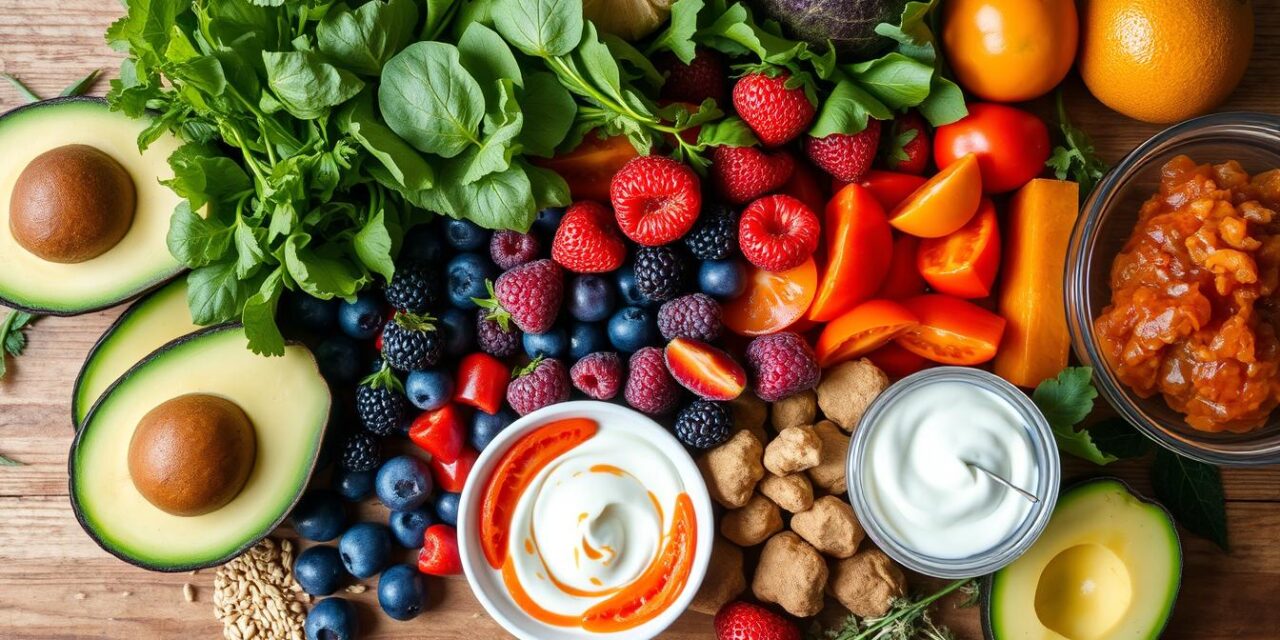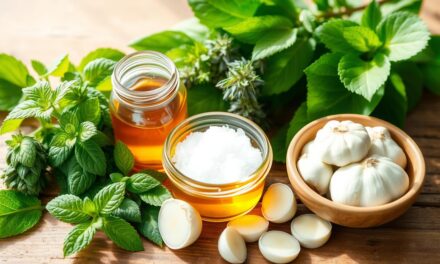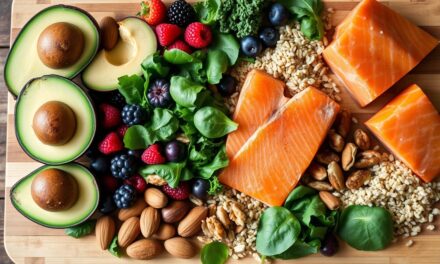Did you know our gut has 100 trillion microorganisms? This is more than our body’s cells. This community, called the gut microbiome, is key to our health. Research shows it affects our physical and mental health.
Eating a gut health diet helps our gut microbes thrive. It supports our digestive system. By eating foods rich in probiotics and prebiotics, we can improve our gut health. This leads to better physical and mental health.
Key Takeaways
- The gut microbiome is a complex ecosystem of trillions of microorganisms that play a crucial role in digestive health and overall well-being.
- A gut health diet focuses on nourishing the gut microbiome with specific probiotic and prebiotic foods to support optimal digestive function.
- Incorporating fermented foods, fibre-rich foods, and anti-inflammatory ingredients can help balance the gut and promote overall wellness.
- Identifying and avoiding potential dietary triggers, such as processed foods and added sugars, is essential for maintaining a healthy gut.
- Practical meal planning strategies can help you seamlessly integrate gut-friendly foods into your daily routine for long-term digestive well-being.
Understanding the Gut Microbiome and Its Impact on Health
The gut microbiome is a complex world of trillions of microorganisms. It plays a key role in our health and well-being. These beneficial bacteria, or gut flora, help with digestion, nutrient absorption, and keeping our immune system strong.
The Role of Beneficial Bacteria in Digestion
Gut bacteria break down and ferment our food. This makes it easier for our body to absorb important nutrients. They also produce enzymes and short-chain fatty acids that help our intestine stay healthy.
How Gut Flora Affects Overall Wellness
The balance of gut flora greatly affects our health. A healthy microbiome is linked to less inflammation, a stronger immune system, and better mood and brain function. On the other hand, an imbalance, or dysbiosis, can lead to health issues like irritable bowel syndrome, obesity, and autoimmune diseases.
Key Functions of a Healthy Microbiome
- Aids in the breakdown and absorption of nutrients
- Supports the immune system and protects against harmful pathogens
- Produces essential vitamins and short-chain fatty acids
- Regulates inflammatory responses and prevents chronic inflammation
- Influences the production of neurotransmitters, impacting mood and mental well-being
Understanding the link between the gut microbiome and health is crucial. It helps us improve our digestive wellness and maintain a balanced gut environment.
The Fundamentals of a Gut Health Diet
Achieving optimal gut health begins with a diet rich in whole foods. These foods nourish your digestive system. A diet filled with gut-friendly foods supports your gut microbiome’s balance. This promotes digestive wellness and overall health.
Fibre-rich foods are crucial in a gut health diet. They feed the good bacteria in your gut. Whole grains, legumes, fruits, and vegetables are key, offering both soluble and insoluble fibre.
Fermented foods are also vital. They include yogurt, kefir, sauerkraut, and kimchi. These foods add probiotics, supporting your gut health and overall wellness.
Adding anti-inflammatory foods to your diet is also important. Leafy greens, berries, fatty fish, and turmeric are examples. They help reduce inflammation and support a healthy digestive system.
By following a gut health diet, you can improve your digestive wellness. This journey can lead to a thriving gut microbiome.
| Gut-Friendly Foods | Benefits |
|---|---|
| Whole Grains | Rich in fibre, which acts as a prebiotic to support gut bacteria |
| Fermented Foods | Contain probiotics that replenish the gut microbiome |
| Leafy Greens | High in antioxidants and anti-inflammatory compounds |
| Berries | Packed with polyphenols that nourish gut bacteria |
| Fatty Fish | Provide anti-inflammatory omega-3 fatty acids |
Essential Probiotics and Prebiotics for Digestive Balance
Keeping your gut healthy is key to feeling good. The balance between probiotics and prebiotics is crucial. Probiotics are good bacteria in your gut that help with digestion and immune function. Prebiotics are fibres that feed these beneficial microbes.
Top Probiotic-Rich Food Sources
Eating foods rich in probiotics is a great way to boost your gut health. Here are some top sources:
- Yogurt and kefir
- Fermented vegetables like sauerkraut and kimchi
- Miso and tempeh
- Kombucha, a fermented tea
- Aged cheeses
Natural Prebiotic Foods to Include Daily
Prebiotics are also vital for a healthy gut. They feed the good bacteria. Here are some natural prebiotic foods to add to your diet:
- Bananas
- Onions
- Garlic
- Whole grains
- Legumes
- Apples
Supplementation Guidelines for Gut Health
If you need extra help for your gut, probiotic and prebiotic supplements can be useful. Choose reputable brands with diverse strains. Always talk to your healthcare provider about the right dosage for you.
By adding probiotic and prebiotic foods to your diet and using supplements, you can support a healthy gut. This promotes overall digestive health.
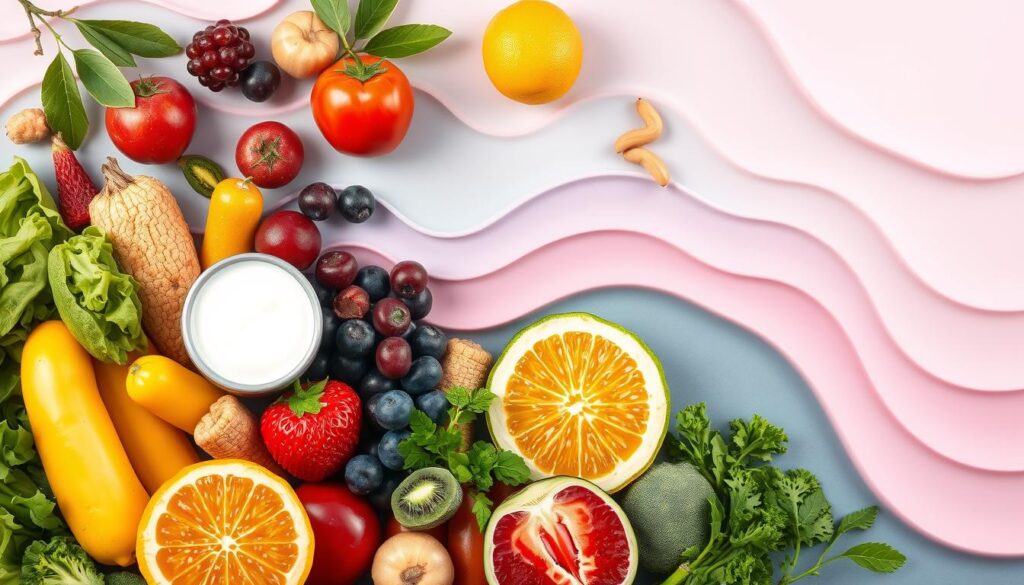
Fermented Foods: Nature’s Digestive Aids
Fermented foods are a big help for our gut health. They add flavour to our meals and are full of good bacteria and enzymes. These can really change how we digest food.
In Australia, we love fermented foods like sauerkraut and yoghurt. They are full of digestive enzymes and gut-friendly probiotics. These help break down food, improve how we absorb nutrients, and keep our gut microbiome healthy.
Exploring the Fermented Bounty
Australian food is full of fermented treats, each with its own taste and health perks. From kimchi to miso, these foods are packed with gut-healing properties. Adding them to our meals can boost digestive wellness and overall health.
| Fermented Food | Health Benefits |
|---|---|
| Sauerkraut | Rich in probiotics, fibre, and vitamins, sauerkraut supports a healthy gut and boosts the immune system. |
| Kefir | A probiotic-packed fermented milk drink that aids digestion, strengthens the gut lining, and enhances nutrient absorption. |
| Tempeh | A fermented soy product that provides a wealth of digestive enzymes, fibre, and protein to support overall gut health. |
“Fermented foods are like a secret weapon for gut health. By incorporating them into our diets, we can unlock the power of nature’s own digestive aids.”
Exploring fermented foods is a key step to a healthy gut microbiome. It’s a simple way to boost our digestive health.
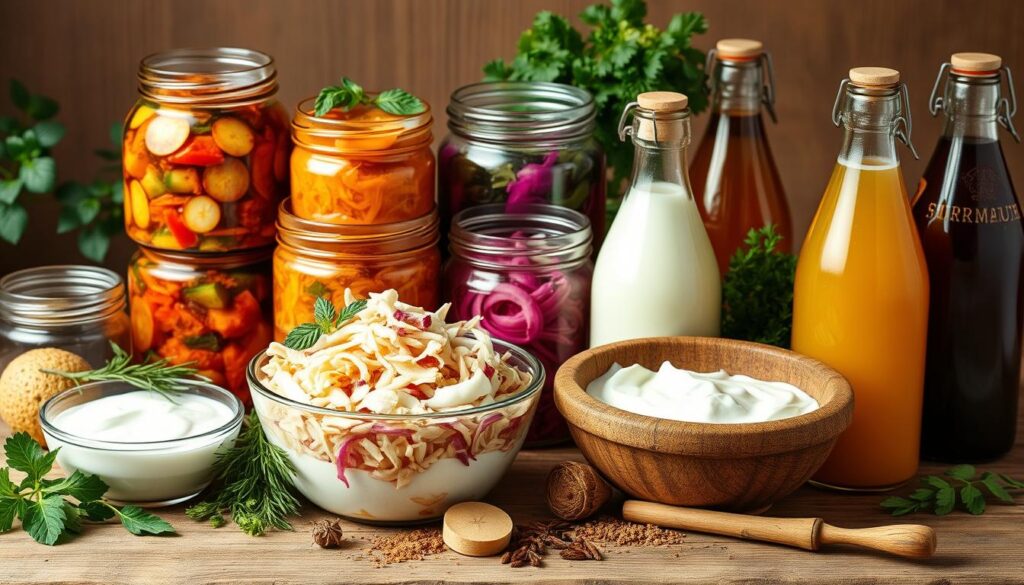
The Power of Fibre-Rich Foods in Gut Healing
Dietary fibre is key to a healthy gut. Soluble and insoluble fibre work together for better digestion. Knowing their benefits helps you eat right for a healthy gut.
Soluble vs Insoluble Fibre Benefits
Soluble fibre turns into a gel in water, helping with bowel movements and preventing constipation. It also feeds good gut bacteria. Insoluble fibre makes stool bulkier, helping waste move through your system.
Daily Fibre Requirements and Sources
Australians need 25-30 grams of fibre daily for a healthy gut. Good sources include:
- Whole grains, such as oats, quinoa, and brown rice
- Legumes, beans, and lentils
- Fruits and vegetables, especially those with skins or peels
- Nuts and seeds
Incorporating Fibre Gradually into Your Diet
Start slowly when adding more fibre to your diet. Begin with small amounts of fibre-rich foods. Gradually increase them over time. Drink plenty of water with these foods to help digestion.
Eating fibre-rich foods regularly helps your gut. It feeds good bacteria, keeps bowel movements regular, and supports digestion.
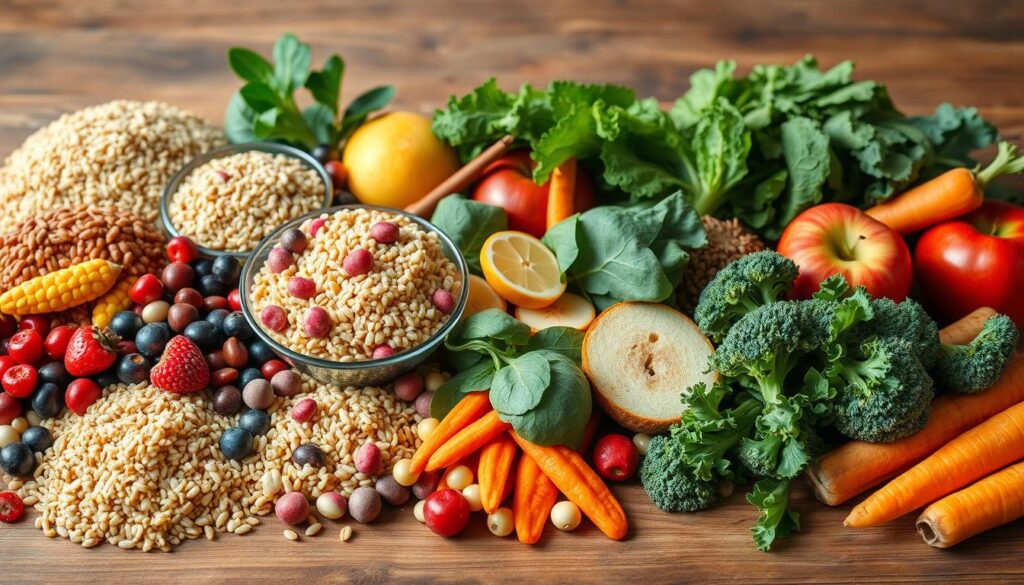
Anti-Inflammatory Foods for Digestive Wellness
Keeping your gut healthy is key for feeling good. Eating foods that fight inflammation can help a lot. These foods are full of nutrients and help your gut work better.
Omega-3 foods like salmon, mackerel, and walnuts are great for your gut. They reduce inflammation and help your gut heal. Fruits and veggies, especially berries, leafy greens, and sweet potatoes, are also good. They’re full of antioxidants and fibre that feed your gut.
- Salmon, mackerel, and walnuts: Packed with omega-3 fatty acids to combat inflammation
- Berries, leafy greens, and sweet potatoes: Antioxidant-rich options that soothe the gut
- Turmeric and ginger: Natural anti-inflammatory spices that can be easily incorporated into meals
Turmeric and ginger are also important. They’re easy to add to many dishes. They help fight inflammation and support your gut health.
| Anti-Inflammatory Food | Key Benefits for Gut Health |
|---|---|
| Salmon | Rich in omega-3s to reduce inflammation, supports gut lining healing |
| Berries | High in antioxidants and fibre, nourish the gut microbiome |
| Turmeric | Powerful anti-inflammatory properties, can soothe digestive distress |
Eating these anti-inflammatory foods every day can help keep your gut healthy. It’s a great way to support your digestive system.
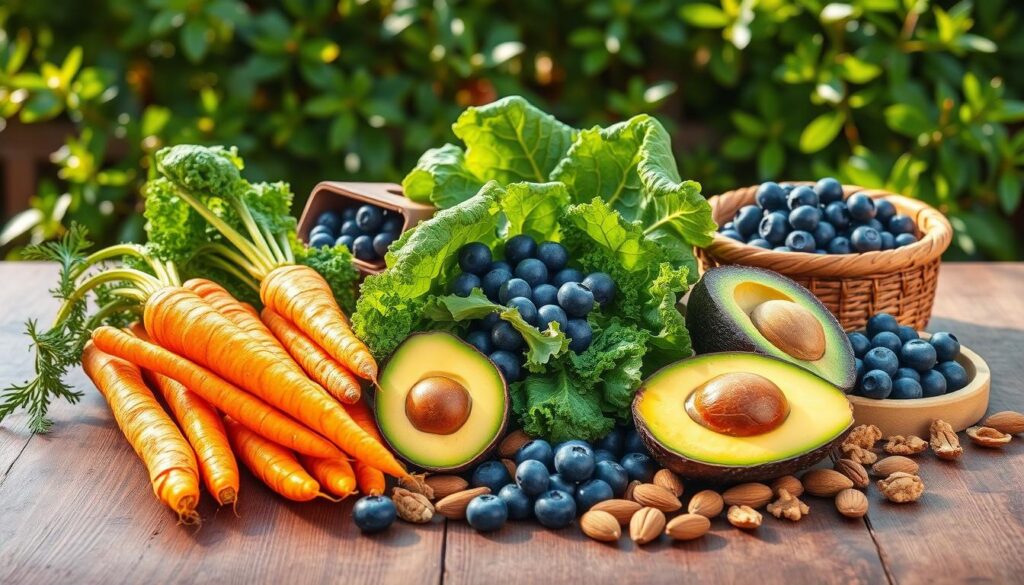
Common Dietary Triggers to Avoid for Better Gut Health
Keeping your gut healthy is key for feeling good. It’s important to know which foods can upset your gut’s balance. We’ll look at how to spot food sensitivities, the bad effects of processed foods, and how to handle sugar and artificial additives.
Identifying Food Sensitivities
Food sensitivities can cause a lot of problems, like discomfort and inflammation. They might even lead to leaky gut syndrome. Trying an elimination diet can help find out which foods bother you. This way, you can choose foods that are better for your gut.
The Impact of Processed Foods
Processed foods often have additives that harm your gut. These foods can upset the balance of good bacteria, causing inflammation and digestive problems. Eating whole, unprocessed foods is a great way to help your gut stay healthy.
Managing Sugar and Artificial Additives
- Too much sugar feeds bad bacteria in your gut, leading to problems like food sensitivities and leaky gut syndrome.
- Artificial additives, like preservatives and sweeteners, can also mess with your gut’s balance and cause inflammation. It’s important to cut down on these.
By watching out for these common dietary triggers and making smart food choices, you can improve your gut health. This is a big step towards better digestion and overall health.
Practical Meal Planning for Optimal Gut Health
Keeping your diet gut-friendly is easy. Just plan and get creative with your meals. Focus on adding foods rich in probiotics, prebiotics, and fibre to your meals.
Begin by filling your pantry and fridge with gut-friendly foods. Think fermented foods like yoghurt, kefir, sauerkraut, and kimchi. Also, include high-fibre foods like oats, lentils, bananas, and Jerusalem artichokes. These foods are key to a gut-healing diet.
Sample Gut-Friendly Meal Plan
| Meal | Recipe | Key Gut-Friendly Ingredients |
|---|---|---|
| Breakfast | Probiotic-Packed Overnight Oats | Oats, kefir, berries, chia seeds |
| Lunch | Lentil and Vegetable Salad with Sauerkraut | Lentils, mixed greens, sauerkraut, olive oil |
| Dinner | Baked Salmon with Roasted Sweet Potatoes and Broccoli | Salmon, sweet potatoes, broccoli, garlic |
| Snack | Yoghurt with Granola and Sliced Banana | Yoghurt, granola, banana |
This meal plan shows how easy it is to eat gut-friendly. By mixing probiotics, prebiotics, and anti-inflammatory foods, you can feed your gut well. Plus, you get to enjoy tasty meals.
For great gut health, try new flavours and textures. Explore gut-friendly recipes, meal planning, and digestive health. Find what works best for you.
“A healthy gut is the foundation for overall wellbeing. By prioritising nutrient-dense, gut-healing foods, you can support your digestive system and unlock a world of health benefits.”
Conclusion
We’ve looked at how important a gut health diet is for good digestion and overall health. The gut microbiome, full of good bacteria, is key to our health. It helps us absorb nutrients and boosts our immune system and brain connection.
Eating foods rich in probiotics and prebiotics helps our gut. Foods like yogurt, kefir, and sauerkraut are great for digestion. Avoiding processed foods and too much sugar also helps our gut heal.
Every person’s gut health needs are different. It’s important to work with health experts to find the right diet for you. By making smart food choices and living a healthy lifestyle, you can improve your gut health. This can lead to many benefits for your overall well-being.
